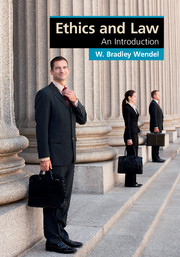Book contents
- Frontmatter
- Contents
- Preface
- Part I Lawyers, ethics, and the law
- 1 Defining the problem
- 2 Justifying principles of professional ethics
- 3 The adversary system
- 4 The nature of law and why it matters
- 5 Legal obligation and authority
- 6 Unjust laws and legal systems
- Part II The many roles of lawyers
- References
- Index
- References
6 - Unjust laws and legal systems
Published online by Cambridge University Press: 05 October 2014
- Frontmatter
- Contents
- Preface
- Part I Lawyers, ethics, and the law
- 1 Defining the problem
- 2 Justifying principles of professional ethics
- 3 The adversary system
- 4 The nature of law and why it matters
- 5 Legal obligation and authority
- 6 Unjust laws and legal systems
- Part II The many roles of lawyers
- References
- Index
- References
Summary
Consider the predicament of Captain Vere in Herman Melville’s novella Billy Budd. Billy, the protagonist, is a good but simple sailor who is wrongfully accused by the malevolent petty officer Claggart of conspiring to mutiny. Suffering from a speech impediment and thus unable to speak in his own defense, Billy strikes Claggart and kills him. Vere believes he has no choice but to convene a court martial to consider the capital charge against Billy of striking a superior officer during wartime. Many readers of Billy Budd are not aware that the character of Captain Vere was modeled on Melville’s father-in-law, Chief Justice Lemuel Shaw of the Supreme Judicial Court of Massachusetts, who was renowned for his opposition to slavery yet was the author of several judgments enforcing the Fugitive Slave Act. Melville clearly means his readers to see Vere as a wise, humane, decent officer. At the same time, he has Vere represent the harshness and rigidity of the law in contrast with considerations of justice. Billy was innocent, framed by Claggart, and Vere knew of his innocence, but Vere nevertheless persuades the other officers to order Billy’s execution by reminding them that leniency might encourage mutiny in the Royal Navy during wartime.
Like the fictional Captain Vere, the real Justice Shaw was a righteous man, yet he saw no alternative to following the law and sending fugitive slaves back to their owners. In Justice Shaw’s eyes, the Fugitive Slave Act, however unjust, was a regrettable necessity in a nation sharply divided over the question of slavery; it was a political compromise that averted the far worse outcome of civil war (which, of course, came in the end anyway). Agree or disagree with Justice Shaw’s reasoning, most historians see him as a decent person faced with a genuine conflict of obligations, not an Eichmann-type official mindlessly serving as a cog in a monstrous machine. Like Captain Vere, Justice Shaw believed he had an obligation to follow the law, despite the clear injustice of the cases before him.
- Type
- Chapter
- Information
- Ethics and LawAn Introduction, pp. 106 - 128Publisher: Cambridge University PressPrint publication year: 2014

